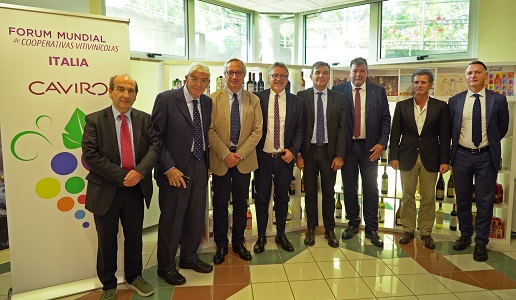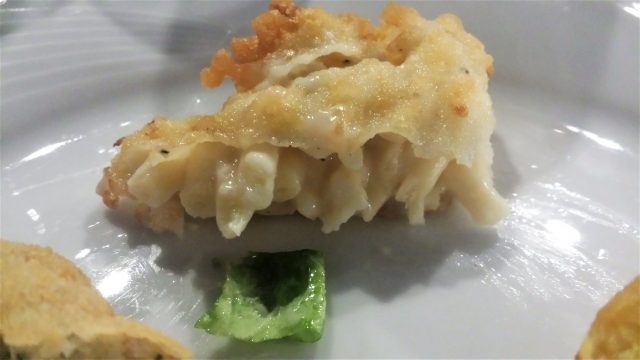World Forum of Wine Cooperatives

Wine has been a staple of the Mediterranean diet for more than 8,000 years. It is produced from a single ingredient, grapes, and is not made through a recipe as is the case with beer and super spirits. As such, it should not be equated with other alcoholic beverages and should not be demonized.
These are the concepts advocated by the international wine system gathered since yesterday in Romagna as part of the World Forum of Wine Cooperatives thanks to the organization of Caviro, who is chairing the group for 2022. "Due to a simplistic and unsupported by data approach, in Europe but also in many other countries around the world, a school of thought is emerging that also accuses wine of being harmful to health on a par with other alcoholic beverages," highlighted Carlo Dalmonte, president of Caviro, opening the Forum. This threatens the survival of a sector that is rooted in our culture and history and supports the biodiversity and economy of many countries.
Representatives of the main wineries from Italy, Spain, France, Uruguay, Chile, Argentina, Portugal and Brazil therefore decided to join forces and involve international scientists and politicians in the debate. They did so as part of the two-day event organized in Romagna and will continue to do so in the coming months with public awareness actions.
"From the studies I have done throughout my life I can say that drinking wine in moderation is healthy and makes you live longer. Excess in alcohol consumption is harmful," said Attilio Giacosa, Scientific Director of the Department of Gastroenterology at the Monza Polyclinic Health Group speaking at the Forum. The reference is to studies that analyze its biotechnological process of fermentation and from which nutrients (anthocyanins, polyphenols, procyanidins, resveratrol) important for the proper functioning of the human body are derived.
The motivation behind the political movement against alcohol is the problem of alcoholism that plagues, in particular, Anglo-Saxon countries. To combat alcohol abuse in many states, including in South America, a "zero tolerance" policy was introduced, involving not only beer and spirits producers but also wine producers.
"We need to distinguish wine from other alcoholic beverages despite the fact that there is, of course, a presence of alcohol in wine as well," explained Luigi Moio, president of OIV, the International Organization of Vine and Wine during the forum. Wine is a single-ingredient product, all the components needed to produce it are within the grape cluster, and alcohol is formed naturally during fermentation, and about 85-86 percent of the content of wine is water. As an alcoholic beverage it is unique because of the way it is obtained and because of the strong ties to the territories in which it originates, the grape varieties typical of these territories, and the culture and traditions associated with it. So much so that wine is emerging as a global phenomenon as a model of diversity. By the way, wine consumed during meals, in small sips and in a responsible and correct way, does not create the problems especially associated with spirits. In addition, its degree of acidity, high presence of water and tannins, help to cleanse the mouth by imparting additional flavor to food. However, it is necessary to distinguish abuse from responsible consumption. A concept, however, that cannot be grasped unless education processes are initiated for those who approach the drink. For historically producing countries, such as Italy, France or Spain, consumption is usually more correct because wine and vines are part of the cultural tradition. But in countries that have not been fortunate enough to grow vines and produce wine, it is necessary to activate training programs that make people understand the very high cultural value of this product and promote responsible consumption, especially during meals."
"Abuse is not fought by prohibiting but by providing information," added Luca Rigotti, Wine Coordinator of the Alliance of Agrifood Cooperatives and President of the Wine Working Group of Copa-Cogeca. "All excessive consumption is harmful and it is necessary to invest in education with respect to moderate and conscious consumption. We are working hard and on this front we need to work together, to transfer the concept of wine as a food and what is the right way to consume it."
At the center of the first day of the Italian meeting was another topic of priority interest for the wine system, namely the circular economy and the role of agriculture for the ecological transition: "A vineyard produces a mass of product of which only a part becomes wine; a part becomes pomace and lees (less than 20%) and pruning clippings," explained SimonPietro Felice, General Manager of Caviro. "The more we are able to recover products and energy even from waste, the more we are able to fulfill our mission. The circular economy model is simple, it starts from the vineyard and returns to the vineyard. For us to close this circle was very important, we completed it with a fertilizer that goes to nourish the soil from which the grapes grow."
Telling the Forum's international guests how Caviro fits its circular policies into the framework of an efficient business model that is in harmony with legislation and the country's needs, Felice added, "Investments in technologies and plants have to be made in 'unsuspected' times. The difficulty is to accept investments of millions in advance. The skill is reading European directives and understanding how they can be transposed in Italy or in the other territories where we operate and anticipating these issues, at least by a couple of years. We move based on macro policy directions, which come to us from important European research tables. Then we have to translate these directives into projects, for which investments, spaces are needed. Clearly a lot also depends on the individual state, its resources, infrastructure, markets."
The second day of the Forum, which is still ongoing, saw guests gathered at the "planning table" to determine next steps. In particular, they discussed relations with international bodies, OIV but also WHO and FAO, difficulties in sourcing raw materials for packaging also with a view to creating purchasing groups among the cooperatives of the Forum, exchange of best practices. Priority was given to outward communication of the relationship between wine and health in order to counter with the utmost urgency the "criminalization" policies in place.
At the end of the morning, the presidency of the Forum for 2023 was entrusted to the Argentine cooperative La Riojana. The World Forum of Wine Cooperatives will close tomorrow with the departure of the guests.
Souce: Ufficio Stampa Caviro
Translated with www.DeepL.com/Translator (free version)

 Italiano
Italiano

.JPG)







